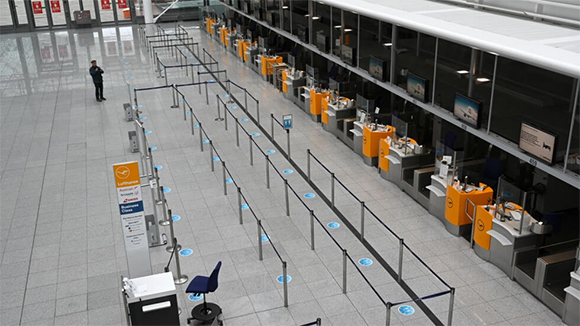The Franz Josef-Strauss airport in Munich, deserted during the mass strike of carriers in Germany, this Monday, March 27, 2023. Photo: AFP.
A 24-hour strike called by unions to demand wage increases has paralyzed train, plane and public transport services in Germany on Monday.
The strike, one of the largest in decades, also affected the transport of goods by rail and ship.
Airport workers, companies that manage highways and local transport joined the strike starting at midnight, as did port and waterway employees.
The mobilization is part of a context of growing social tensions in Germany, where strikes to demand wage increases have multiplied since the beginning of the year, from schools to hospitals, including the post office, AFP reported.
Throughout the country, long-distance train traffic was suspended, as well as regional lines, according to the Deutsche Bahn railway company.
At most airports, including the main Frankfurt and Munich, flights were cancelled.
In many large cities, public transport is affected.
In Berlin, the S Bahn network (tram and subway system) was blocked.
According to AFP, unlike in other European countries such as France, a joint movement between the German unions EVG and Ver.di, which respectively represent 230,000 railway company workers and 2.5 million service sector employees, is extremely rare. .
Trains parked near the central station in Frankfurt, Germany, Monday, March 27, 2023, during the national transport strike.
Photo: AP.
The strike forced many workers from various sectors who usually use public transport to choose to travel by car, which caused traffic jams on the roads, while those who could do so worked from home.
The unions are demanding a rise of at least 10.5% in wages and have rejected offers from employers for a 5% hike in two stages plus punctual payments.
High inflation in other parts of the world has hit many workers hard, Ulrich Silberbach of the Civil Service Federation said, according to AP.
"We have registered decreases in real wages and they must be compensated," he told reporters in Berlin.
Some members of his union in big cities have had to apply for state aid to pay their rent, he added.
Silberbach said he hoped employers would increase their offer in the next round of talks, or unions would have to consider an indefinite strike.
His colleague Martin Burkert, from the EVG railway union, lamented that workers' salaries are only a fraction of what some managers earn.
But rail operator Deutsche Bahn said the unions' demands were exaggerated and warned that millions of passengers would be affected.
"Thousands of companies that normally send or receive their goods by rail will also suffer," a Deutsche Bahn spokesman said.
“The environment and the climate will also suffer in the end.
The winners today are the oil companies,” he added.
Three days of negotiations have been scheduled between the two parties.
Home Secretary Nancy Faeser, who is representing the federal government in the negotiations, said her side would engage in the talks in a "tough, but also fair and constructive" way.
The stoppages had already caused problems and delays on Sunday, when many travelers tried to reach their destinations in advance.
(With information from AFP and AP)
